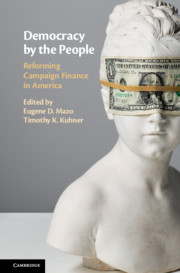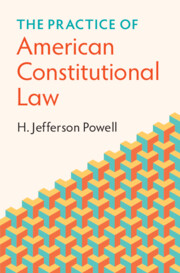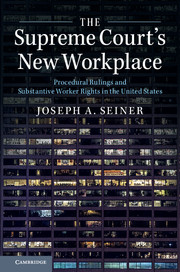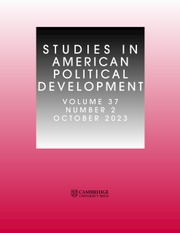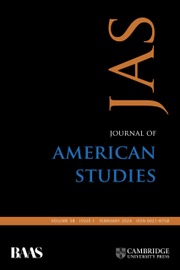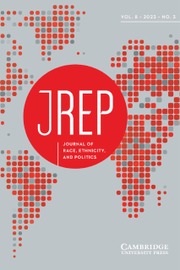The Law of Freedom
The Supreme Court and Democracy
- Author: Jacob Eisler, University of Southampton
- Date Published: July 2023
- availability: Available
- format: Paperback
- isbn: 9781108412247
Paperback
Other available formats:
Hardback, eBook
Looking for an inspection copy?
Please email [email protected] to enquire about an inspection copy of this book
-
The Supreme Court has been at the center of great upheavals in American democracy across the last seventy years. From the end of Jim Crow to the rise of wealth-dominated national campaigns, the Court has battled over if democracy is an egalitarian collaboration to serve the good of all citizens, or a competitive struggle by private interests. In The Law of Freedom, Jacob Eisler questions why the Court has the moral authority to shape democracy at all. Analyzing leading cases through the lens of philosophy and social science, Eisler demonstrates how the soul of election law is a battle between two philosophical understandings of democratic freedom and popular self-rule. This remarkable book reveals that the Court's battle over democracy has shaped how Americans rule themselves, marking election law as the most dramatic judicial intervention in constitutional history.
Read more- Introduces a philosophical approach to election law and the problem of judicial authority
- Offers novel insights about the development, foundations, and impact of the Supreme Court upon American democracy
- Provides a unifying account of election law disputes on the Supreme Court
Reviews & endorsements
'In this powerfully argued and beautifully clear work, Jacob Eisler gives us a framework for understanding a dilemma at the core of modern liberal democracy. Though the 'counter-majoritarian difficulty' is familiar, Eisler introduces the more troubling 'counterpopular dilemma': how can courts police democratic processes. Through a careful exposition of the ideals of election law in light of the principles of democracy, Eisler provides an essential guide to making courts safe for democracy. More importantly, he gives us a map for remaking a democracy that might live up to its ideals.' Lawrence Lessig, Harvard Law School
See more reviews'Election law has long ignored a question that should be at its core: Why should unaccountable judges – not the regular political process – decide the kind of democracy we live in? This sophisticated book, grounded in both democratic theory and legal doctrine, finally focuses on judicial review of electoral regulation. Its persuasive claim is that courts' role in this area must be forever unsettled, always grappling with disputes among different theories of liberty and equality but never definitely resolving them.' Nicholas Stephanopoulos, Harvard Law School
'Eisler draws on important doctrines in the the philosophy literature to inform what had been an intractable debate about the legitimacy of judicial review over the democratic process. The book is a must read for anyone seeking a theoretically sound justification for why the interests of the people must be paramount when courts resolve questions implicating democratic design, rights, and governance.' Franita Tolson, University of Southern California Gould School of Law
Customer reviews
Not yet reviewed
Be the first to review
Review was not posted due to profanity
×Product details
- Date Published: July 2023
- format: Paperback
- isbn: 9781108412247
- length: 300 pages
- dimensions: 230 x 152 x 19 mm
- weight: 0.512kg
- availability: Available
Table of Contents
Introduction
1. The counterpopular dilemma
2. Constitutionalism and the counterpopular dilemma
3. Traversing the dilemma: normative struggle over freedom
4. One-person one-vote: the triumph of minimal procedural equality
5. Campaign finance: contesting voters' cognitive capacities
6. Parties in democracy: facilitators or usurpers of popular self-rule?
7. Race and elections: equality of access or equality of power?
Conclusion: the debate over liberalism, the partisan alternative, and the future of election law.
Sorry, this resource is locked
Please register or sign in to request access. If you are having problems accessing these resources please email [email protected]
Register Sign in» Proceed
You are now leaving the Cambridge University Press website. Your eBook purchase and download will be completed by our partner www.ebooks.com. Please see the permission section of the www.ebooks.com catalogue page for details of the print & copy limits on our eBooks.
Continue ×Are you sure you want to delete your account?
This cannot be undone.
Thank you for your feedback which will help us improve our service.
If you requested a response, we will make sure to get back to you shortly.
×

